In the detailed landscape of home security, understanding the key differences between smart locks and traditional locks is essential. Traditional locks, like deadbolts and cylinder locks, offer reliability and simplicity through mechanical components and physical keys. In contrast, smart locks utilize technological advancements such as Wi-Fi and Bluetooth, enabling remote access and keyless entry. They also integrate with smart home systems for added convenience and advanced security features. Both options provide unique benefits, and user preferences often dictate the choice. To explore the nuances and applications of each type, we invite you to gain further insights into this exhaustive comparison.
Key Takeaways
- Traditional locks offer reliability through simple mechanical components and physical keys.
- Smart locks provide convenience with features like keyless entry and remote access via Wi-Fi or Bluetooth.
- Traditional locks seamlessly blend with various architectural styles and have a historical background.
- Smart locks integrate with smart home systems, enhancing security through technology.
- User preferences and cost analysis guide homeowners in choosing between traditional and smart locks.
Introduction
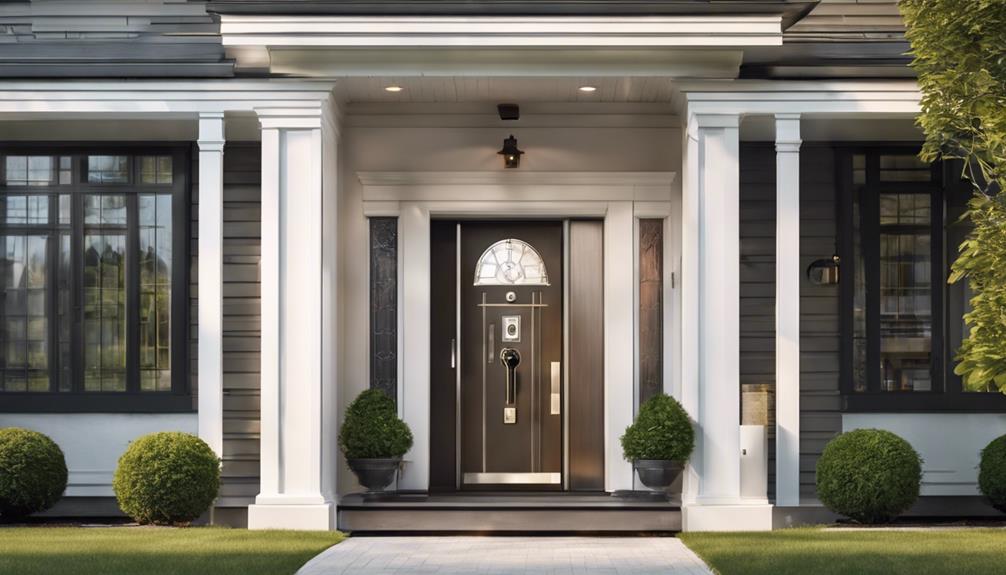
Home security is a critical concern for homeowners, necessitating reliable and effective locking mechanisms. This article compares smart locks and traditional locks, examining their respective features and benefits. By understanding the differences between these two types of locks, readers can make informed decisions about their home security solutions.
Overview of the Importance of Home Security
Ensuring robust home security is paramount for homeowners, as it provides peace of mind and protection against potential threats. The significance of home security cannot be understated, encompassing various security features that deter intrusions and safeguard assets. User experience is essential, as an easy-to-navigate system enhances daily life. The installation process also plays a significant role, with simpler setups being more appealing to users. Cost analysis is important in determining the balance between affordability and security, guiding homeowners toward the best investment. Real world applications demonstrate the practical benefits of robust home security, from preventing burglaries to enabling remote surveillance. Therefore, understanding the importance of these factors is essential for making informed decisions about home security solutions.
Purpose of the Comparison between Smart Locks and Traditional Locks
Understanding the importance of robust home security leads us to examine the purpose of comparing smart locks and traditional locks. This security comparison aims to illuminate differences in functionality and features, helping homeowners make informed choices. By delving into the technological advancements offered by smart locks, it becomes clear how these modern systems can enhance home safety with features like remote access and keyless entry. Simultaneously, evaluating traditional locks highlights their reliability and simplicity. User preferences play a critical role in this analysis, as some may prioritize advanced technology, while others value traditional security measures. Ultimately, this lock system evaluation provides valuable insights into which type of lock best meets individual home security needs.
Brief Introduction to Smart Locks and Traditional Locks
Smart locks and traditional locks represent two distinct approaches to securing residential properties, each with its unique set of features and benefits. Traditional locks rely on physical keys and manual operation, offering a reliable and simple security layer without the need for batteries or power sources. In contrast, smart locks leverage technology advancements like Wi-Fi and Bluetooth connectivity, enabling remote access, keyless entry, and integration with smart home systems. This security comparison highlights how user preferences vary, with some favoring the proven durability of traditional locks, while others seek the convenience and advanced security of smart locks. Industry insights suggest that future trends will continue to evolve, with smart locks potentially becoming more prevalent as technology progresses.
What Are Traditional Locks?

Traditional locks have been a cornerstone of home security for centuries, relying on mechanical components and physical keys. They come in various forms, including deadbolt locks, cylinder locks, and lever handle locks, each offering unique features and levels of security. Despite the rise of digital alternatives, traditional locks remain widely used due to their proven reliability and simplicity.
Definition and Historical Background
The enduring reliability of traditional locks lies in their mechanical pin tumbler design, which has secured homes for generations without the need for electricity. Their historical significance dates back to ancient civilizations, showcasing an evolutionary timeline from rudimentary wooden mechanisms to sophisticated brass and steel constructs. These locks have not only been integral to personal security but also hold cultural implications, symbolizing safety and ownership across societies. Architectural integration of traditional locks has seamlessly blended with various styles, from classic to contemporary structures. Despite the technological advancements over the centuries, the fundamental mechanics of traditional locks have remained largely unchanged, underscoring their simplicity and durability as a trusted security solution.
Common Types of Traditional Locks
Building on the historical significance and enduring reliability of traditional locks, it is important to explore the various types commonly found in homes today. Traditional locks include a range of styles, each with unique lock mechanisms and security benefits. These locks rely on key operation and require regular lock maintenance for peak performance and home protection.
| Lock Type | Security Benefits |
|---|---|
| Pin Tumbler Lock | Simple, reliable security |
| Mortise Lock | Enhanced strength and durability |
| Rim Lock | Easy installation, basic security |
| Cam Lock | Versatile, moderate security |
Understanding these common types helps homeowners make informed decisions about their home security. While traditional locks might lack advanced features, their mechanical simplicity and resistance to electronic hacking make them a dependable choice for home protection.
Deadbolt Locks
Deadbolt locks, a staple in home security, embody simplicity and effectiveness with their manual locking mechanism and physical key requirement. Known for their traditional effectiveness, deadbolt locks offer varied security levels to thwart unauthorized access. Their tampering resistance makes them a reliable option, as they are less susceptible to picking and forced entry compared to other lock types. Durability factors further enhance their appeal, as deadbolt locks are constructed to withstand significant physical force. Key matching capabilities allow homeowners to integrate multiple locks under a single key, enhancing convenience without compromising security. While lacking the advanced features of modern smart locks, deadbolt locks remain a trusted and robust choice for securing residential properties.
Cylinder Locks
Operating through a pin tumbler mechanism housed within a cylindrical casing, traditional cylinder locks provide a straightforward yet effective security solution for residential properties. The internal mechanisms involve pins that must align with the notches on a physical key to open, ensuring robust security features. Key operation is simple, requiring insertion and turning of the key to engage or disengage the lock. Convenience factors include the widespread availability of these locks and their ease of use. Maintenance requirements are minimal, typically involving occasional lubrication to guarantee smooth operation. These locks are not susceptible to electronic hacking, offering peace of mind against cyber threats, making them a reliable choice for homeowners seeking a tried-and-true security solution.
Lever Handle Locks
Lever handle locks, a prevalent type of traditional lock, utilize a lever mechanism to secure doors in residential and commercial settings. Renowned for their robust security features, these locks provide a straightforward method of protection using a physical key. The durability comparison with other lock types highlights their resistance to tampering and picking, making them a reliable choice. Their ease of use is another advantage, offering simple manual operation without the need for electronic components. The installation process is relatively straightforward, often requiring minimal tools and expertise. From a cost analysis perspective, lever handle locks are generally affordable, providing an efficient security solution without the higher expense associated with more advanced locking mechanisms like smart locks.
How Traditional Locks Work
Traditional locks, which have been a staple in home security for decades, primarily function through a mechanical pin tumbler system that necessitates the alignment of pins within a lock cylinder by a physical key. This key operation is straightforward, relying on internal mechanics to secure entry points. The security features of traditional locks include resistance to electronic hacking, providing a reliable analog solution. Their convenience benefits are found in their simplicity and ease of use. The installation process is generally uncomplicated, often requiring only basic tools and skills. While traditional locks may lack advanced capabilities and remote access features, they offer a trusted and durable method for home security that has stood the test of time.
Internal Mechanisms
Understanding the internal mechanisms of traditional locks reveals the mechanical intricacies that have made them a staple in home security for decades. These locks primarily employ pin tumbler technology, which relies on a physical key to align pins within the lock cylinder, facilitating the opening process. A comparison of internal mechanisms highlights several critical aspects:
- Lock cylinder differences: Traditional locks use various cylinder designs, impacting security and durability.
- Pin tumbler technology: The effectiveness of this technology is evident in its widespread use.
- Security layer effectiveness: Traditional locks provide a straightforward yet robust security layer without electronic components.
These time-tested mechanisms ensure dependability, making traditional locks a trusted choice for securing homes.
Key Operation
Fundamentally, traditional locks operate through a mechanical pin tumbler system that requires a physical key for entry. This system has been a cornerstone of home security for decades, offering reliability and simplicity. Key security is a primary concern, as the physical key can be duplicated, necessitating careful key management practices. Lock picking poses another risk, highlighting the need for robust locks to deter unauthorized access. Over time, keys may wear out or be lost, requiring key replacement to maintain security. While traditional locks do not offer the advanced features of smart locks, they provide a straightforward, electricity-free solution. Key duplication and management are integral to maintaining the efficacy and security of traditional lock systems.
What Are Smart Locks?
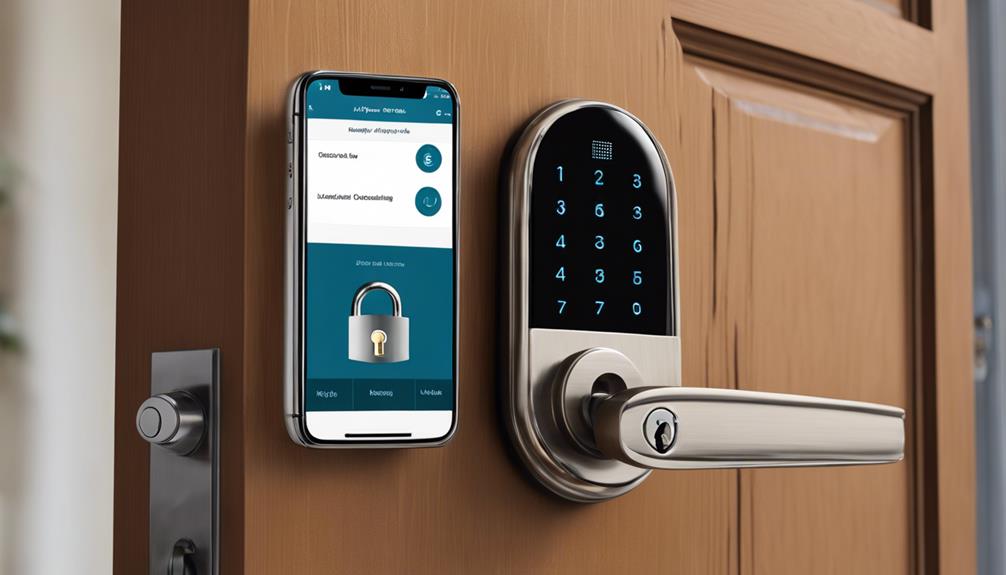
Smart locks are advanced locking systems that utilize electronic mechanisms and Wi-Fi connectivity to enhance home security. These locks offer various types, including Bluetooth, Wi-Fi, and Z-Wave smart locks, each providing unique features such as remote control, keyless entry, and real-time alerts. By integrating traditional security with modern technology, smart locks cater to the evolving needs of homeowners seeking both convenience and robust protection.
Definition and Technological Evolution
Advancements in home security have led to the development of smart locks, technologically advanced systems that offer electronic operation and Wi-Fi connectivity. These innovative devices redefine the concept of home security by replacing traditional locks with modern, keyless mechanisms. The evolution of smart lock technology has introduced significant benefits such as remote access, customizable access control, and integration with smart home ecosystems.
Key highlights include:
- Remote Access: Control your locks from anywhere using your smartphone.
- Keyless Entry: Eliminate the need for physical keys, enhancing convenience.
- Enhanced Security Features: Activity logs, door sensors, and voice assistant compatibility.
In comparison to traditional locks, smart locks provide enhanced security and flexibility, making them an ideal choice for the modern homeowner.
Common Types of Smart Locks
Various types of smart locks, such as keypad, biometric, key fob, and Bluetooth-enabled locks, offer diverse security solutions tailored to different user needs. Keypad smart locks provide keyless entry using numerical codes, enhancing convenience and security features. Biometric smart locks utilize fingerprint or facial recognition technology, guaranteeing personalized access control. Key fob smart locks employ proximity technology for seamless entry, greatly improving user experience. Installation tips often recommend professional assistance to avoid compatibility issues with existing door setups. Regular upkeep, as outlined in the maintenance guide, guarantees excellent performance and longevity. Despite their advanced capabilities, some smart locks may face compatibility issues with older home systems, necessitating thorough research before installation.
Bluetooth Smart Locks
Bluetooth smart locks leverage wireless technology to seamlessly connect with smartphones or other devices, offering a modern solution for remote access control. These locks utilize Bluetooth security to guarantee wireless access without the need for physical keys, enhancing convenience and flexibility. With mobile control, homeowners can secure or lock doors remotely, providing enhanced smart connectivity and peace of mind.
Key features of Bluetooth smart locks include:
- Keyless access: Eliminates the need for traditional keys, using Bluetooth connectivity.
- Remote monitoring: Provides real-time monitoring and activity logs for enhanced security.
- Smart home integration: Can be seamlessly integrated with other smart home devices for thorough control.
Bluetooth smart locks represent a significant advancement in home security, blending technology with convenience.
Wi-Fi Smart Locks
Wi-Fi smart locks utilize electronic mechanisms and Wi-Fi connectivity to provide keyless entry and remote access control for enhanced home security. The Wi-Fi connectivity benefits of these smart locks allow homeowners to manage their locks remotely via smartphones or other authorized devices, offering significant remote access advantages. This feature guarantees that access can be granted or denied from virtually anywhere, enhancing convenience. Additionally, Wi-Fi smart locks deliver real-time alerts on unauthorized access attempts, bolstering their effectiveness in protecting the home. Integration with other smart home systems further amplifies their utility, creating a seamless security ecosystem. Overall, Wi-Fi smart locks provide a sophisticated and reliable option for those seeking enhanced home security and modern convenience.
Z-Wave Smart Locks
Z-Wave smart locks, utilizing a sophisticated wireless technology protocol, enable secure and efficient communication between various smart home devices. These advanced locks offer several important benefits:
- Wireless technology: Z-Wave guarantees seamless integration with other smart home gadgets like lights and thermostats.
- Data security: They employ robust encryption methods to safeguard communication, enhancing overall security.
- Remote access: Homeowners can control their locks from anywhere using smartphones or smart home hubs.
In addition to these benefits, Z-Wave smart locks stand out for their interoperability advantages and energy efficiency. The protocol allows diverse devices to work harmoniously, creating a cohesive smart home ecosystem. Furthermore, Z-Wave’s energy-efficient design ensures prolonged battery life, making these locks a sustainable choice for modern homeowners.
How Smart Locks Work
Understanding how smart locks work begins with recognizing that these electronic locking systems leverage wireless technologies such as Bluetooth or Wi-Fi to enable secure, keyless entry and remote control capabilities. The installation process typically involves replacing or retrofitting existing locks with smart lock hardware, which can be managed via smartphones or other authorized devices. Keyless operation is facilitated through touchpad codes, key fobs, or mobile apps, eliminating the need for traditional keys. Remote access allows homeowners to secure or access doors from a distance, enhancing convenience. Various connectivity options guarantee compatibility with different smart home ecosystems. Robust security mechanisms, including encryption and customizable access controls, further strengthen the protective capabilities of smart locks, making them a modern solution for home security.
Connectivity and Technology
Smart locks are sophisticated electronic locking systems that utilize technologies such as Bluetooth and Wi-Fi to offer keyless entry and enhanced security features. These modern devices harness technological advancements to provide an improved user experience, but they also come with certain connectivity challenges and potential security risks.
Key features include:
- Real-time access monitoring: Users can track who enters and exits their home.
- Tamper alerts: Instant notifications if someone attempts unauthorized access.
- Data encryption: Guarantees secure communication between the lock and the user’s devices.
While smart locks offer a convenient and customizable approach to home security, they rely heavily on robust data encryption to mitigate security risks. It is vital to take these factors into account when evaluating the overall reliability and effectiveness of smart locks.
Keyless Operation and Remote Access
Modern electronic devices, smart locks enable keyless entry and offer remote access, transforming the way homeowners secure their properties. By leveraging Bluetooth connectivity and Wi-Fi, these locks allow users to control access via smartphones or smart home devices, ensuring keyless convenience. Advanced security protocols safeguard against unauthorized entry, while remote monitoring capabilities let homeowners track real-time access activity. This functionality provides flexibility, allowing temporary access for guests or service personnel. Smart locks’ integration with home automation systems enhances security by enabling instant locking or opening from any location, combining convenience with robust security measures. The ability to monitor and manage home security remotely presents a significant advancement over traditional locks, elevating modern home protection to new heights.
Comparison: Security Features
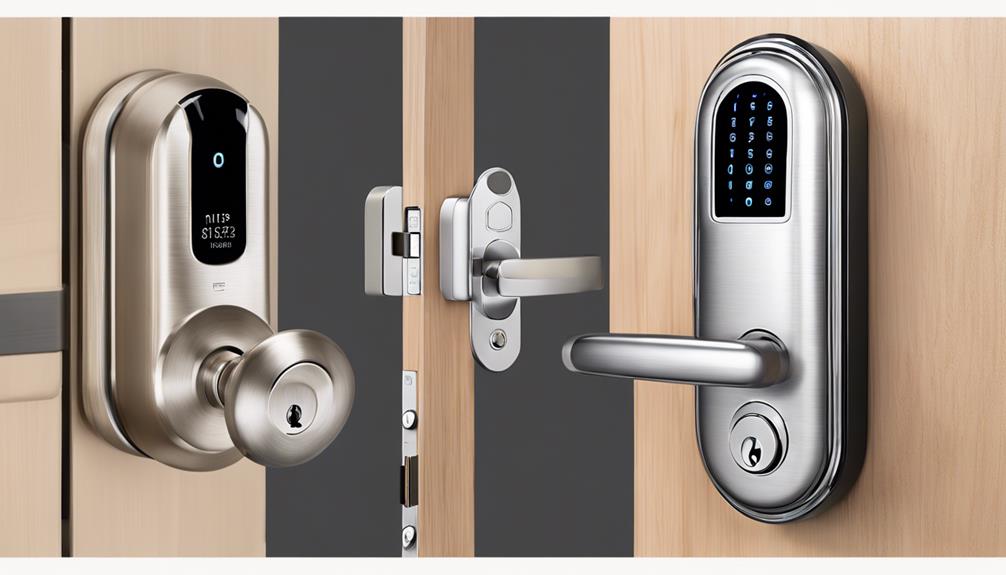
When comparing the security features of smart locks and traditional locks, it is essential to assess the unique security mechanisms each offers. Traditional locks are known for their reliability and durability, while smart locks bring advanced features like encryption, two-factor authentication, and real-time monitoring. Additionally, understanding the vulnerabilities and protection measures inherent in both types of locks can help homeowners make an informed decision about their security needs.
Security Mechanisms in Traditional Locks
Traditional locks, relying on a mechanical system of pins and tumblers, provide a time-tested and reliable method of securing homes. Despite their simplicity, these locks address several security concerns:
- Lock picking: Quality traditional locks are designed to resist lock picking attempts through complex pin configurations.
- Key duplication: High-security locks often use unique key designs to minimize the risks associated with key duplication.
- Lock maintenance: Regular upkeep guarantees the smooth operation and longevity of traditional locks, preventing security vulnerabilities.
However, traditional locks are not without their limitations. They can be susceptible to certain security vulnerabilities, including brute force attacks and advanced tampering techniques. Nonetheless, anti-snap and tamper-resistant designs offer enhanced protection, maintaining their reputation as reliable security solutions.
Advanced Security Features in Smart Locks
Smart locks bring an array of advanced security features that greatly enhance home protection capabilities. Among these features, biometric authentication, such as fingerprint scanning, provides a robust layer of security by ensuring only approved individuals can gain access. Tamper alerts notify homeowners of any unauthorized attempts to breach the lock, adding an extra level of vigilance. Activity logs track and record all entries and exits, offering valuable insights into access patterns. Real-time monitoring allows users to oversee their home’s security status remotely, ensuring timely responses to potential threats. Additionally, smart locks prioritize data protection to safeguard against cyber threats, ensuring that sensitive information remains secure. These advanced features collectively position smart locks as a superior choice for modern home security.
Encryption and Two-Factor Authentication
Building on the advanced security features of smart locks, encryption and two-factor authentication greatly bolster the overall protection by guaranteeing data integrity and verifying user identity through multiple verification steps. Data encryption guarantees that information is encoded, preventing unauthorized access and enhancing privacy protection. Multi-factor authentication (MFA) adds an extra layer of security by requiring two forms of identification, such as a password and biometric data, before granting access. These cybersecurity measures make smart locks more resilient to hacking attempts compared to traditional locks.
- Data encryption: Encodes information to maintain privacy protection.
- Multi-factor authentication: Enhances access control through multiple verification methods.
- Cybersecurity measures: Strengthen overall security and protect against cyber threats.
Real-Time Alerts and Monitoring
One significant advantage of modern smart locks is their ability to provide real-time alerts and monitoring, which enhances home security by promptly notifying homeowners of any unauthorized access attempts or tampering. Equipped with sensors and connectivity, smart locks offer instant alerts directly to smartphone apps or connected devices. This feature guarantees that homeowners receive tampering notifications and security alerts in real-time, enabling prompt responses to potential threats. Traditional locks, on the other hand, lack such capabilities, relying solely on physical barriers without the benefit of live updates or instant alerts. As a result, real-time monitoring provided by smart locks represents a substantial upgrade in security features for those seeking advanced, proactive home protection solutions.
Vulnerabilities and Protection in Both Lock Types
Examining the vulnerabilities and protection features of both traditional and smart locks reveals distinct advantages and potential drawbacks inherent in each system. Traditional locks boast reliability and simplicity, with safety features in traditional locks including robustness against electronic malfunctions and minimal maintenance needs. However, they lack advanced monitoring capabilities.
Smart locks, while offering convenience and real-time control, are not without risks. Cybersecurity risks in smart locks, such as hacking and technical failures, present significant concerns. Despite this, they provide advanced security features like tamper alerts and access logs.
Key points to take into account:
- Protection measures for traditional locks provide reliability without dependency on power.
- Security flaws in smart locks include potential hacking vulnerabilities.
- Cybersecurity risks in smart locks necessitate robust digital protection protocols.
Comparison: Convenience and Accessibility
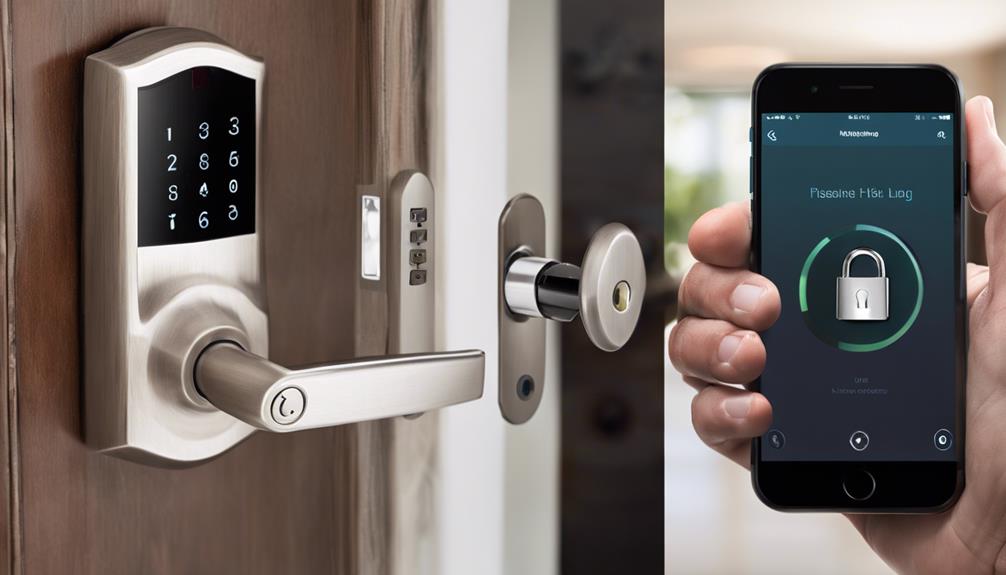
When comparing convenience and accessibility, traditional locks are straightforward but require physical keys, which can be misplaced or forgotten. In contrast, smart locks offer enhanced convenience through features like keyless entry, remote access, and integration with smart home systems. These advanced capabilities not only simplify user experience but also provide greater flexibility and control over home security.
Ease of Use for Traditional Locks
Despite their simplicity and straightforward operation, traditional locks can be inconvenient due to the necessity of physical keys, which are prone to being lost or misplaced. Accessing traditional locks typically involves a time-consuming process of manual turning, making them less convenient compared to modern alternatives. The lack of keyless operation means homeowners must carry keys at all times, increasing the likelihood of inconvenient access if keys are forgotten or lost.
- Manual turning of the key can be cumbersome, particularly in low light or adverse weather conditions.
- Time-consuming process to open, especially with complex or stiff locks.
- Lost keys can result in being locked out, requiring professional assistance to regain entry.
These factors highlight the limitations of traditional locks in terms of ease of use.
Enhanced Convenience with Smart Locks
Contrasting with the cumbersome nature of traditional locks, smart locks deliver unparalleled convenience by offering keyless entry and remote access control. These advanced systems enhance security through features like smartphone integration, allowing homeowners to lock or open their doors from anywhere. The ability to create customized codes for different users guarantees that access can be monitored and managed efficiently. Temporary access can be granted to guests or service providers without the need for physical keys.
| Feature | Benefit |
|---|---|
| Keyless Entry | Eliminates need for physical keys |
| Remote Control | Manage access from anywhere |
| Customized Codes | Enhanced security and monitoring |
Smart locks seamlessly integrate with smart home systems, offering a modern solution for accessible and secure home entry.
Remote Access and Control
Smart locks greatly enhance convenience and accessibility by enabling remote access and control through smartphones or connected devices. This modern technology allows homeowners to manage their security protocols efficiently and offers several advantages over traditional locks:
- Remote management: Control locks from anywhere, providing peace of mind and flexibility.
- Access permissions: Grant temporary or permanent access to guests or service providers without needing a physical key.
- Mobile control: Use your smartphone to open, lock, and monitor your home, ensuring seamless operation.
With virtual keys, users can distribute access electronically, eliminating the need for physical keys. This capability greatly contrasts with traditional locks, which depend on manual operation and physical keys, offering limited accessibility and convenience.
Integration with Smart Home Systems
Integrating with smart home systems, modern locks offer extensive convenience and accessibility by allowing users to control and monitor their security from a single, centralized platform. Through smart home integration, these locks enable remote monitoring, ensuring homeowners can keep an eye on their property from anywhere. Centralized control simplifies the management of multiple security features, while automation options enhance daily routines, such as automatically locking doors at night. Smart locks also provide seamless synchronization with other smart devices like security cameras, lights, and thermostats, creating a cohesive and detailed security system. These advanced capabilities highlight the significant advantage smart locks have over traditional locks, which lack connectivity and cannot offer the same level of integration and control.
User Experience and Accessibility
User experience and accessibility are pivotal factors when comparing the convenience of smart locks to that of traditional locks. Smart locks offer a modern user interface that simplifies operation through smartphones or smart home devices, bringing various accessibility options to the forefront.
- Remote management: Access your home from anywhere via a smartphone app.
- User customization: Tailor entry permissions for different users, enhancing security and convenience.
- Convenience features: Enjoy keyless entry, eliminating the hassle of physical keys.
In contrast, traditional locks rely on manual operation with physical keys, limiting their accessibility and convenience. They lack remote management capabilities and customizable access, making them less adaptable for users seeking modern convenience features. Therefore, smart locks enhance user experience and accessibility in home security.
Comparison: Installation and Maintenance
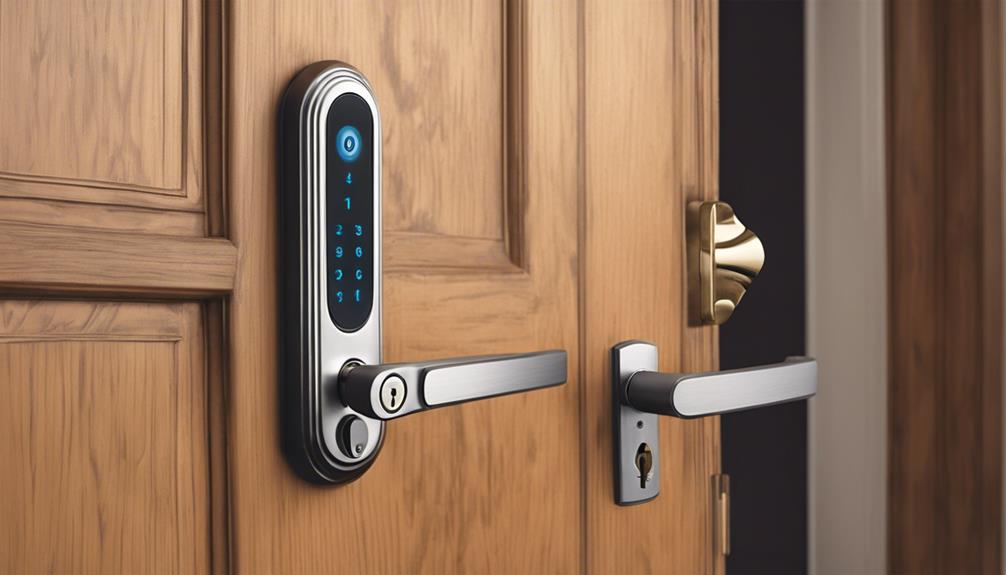
When comparing the installation and maintenance of smart locks versus traditional locks, several critical factors come into play. Traditional locks generally offer a straightforward installation process that most homeowners can manage with basic tools and skills, whereas smart locks often necessitate professional installation due to their electronic components and connectivity requirements. Additionally, maintaining smart locks involves regular software updates and battery replacements, in contrast to the minimal upkeep needed for traditional locks.
Installation Process for Traditional Locks
Traditional locks offer a straightforward installation process that homeowners can typically complete with basic tools and minimal technical knowledge. This ease of installation makes them a popular choice for those who prefer a DIY approach. Here are some useful installation tips:
- DIY guide: Follow a step-by-step guide to guarantee proper alignment and secure fitting.
- Common mistakes: Avoid over-tightening screws, which can result in misalignment and operational issues.
- Quick fixes: If the lock doesn’t turn smoothly, a bit of lubrication can often resolve the issue.
Expert advice recommends checking the door frame’s condition before installation to ensure longevity and effectiveness. Traditional locks not only simplify the installation process but also offer reliable security with minimal maintenance.
Tools and Skills Required
Although traditional locks require only basic tools and minimal technical skills for installation, the installation and maintenance of smart locks often demand more specialized knowledge and equipment. Traditional locks typically involve straightforward DIY options with minimal installation challenges, using tools like screwdrivers and involving simple maintenance requirements such as lubrication and key replacement. Conversely, smart locks present more complex installation challenges due to their electronic components and connectivity needs, often necessitating technical expertise and even professional assistance. Maintenance for smart locks includes software updates, battery replacements, and troubleshooting connectivity issues, which can be more demanding than the care needed for traditional locks. Therefore, while smart locks offer advanced features, their installation and upkeep can be more intricate.
Installation Process for Smart Locks
Installing smart locks involves a blend of technical understanding and practical skills to guarantee proper alignment and functionality. While many smart locks can be installed by homeowners within 30 minutes to an hour, understanding best practices is important for avoiding common mistakes. Here are some essential installation tips:
- Ensure proper alignment: Misalignment can lead to functionality issues.
- Follow a troubleshooting guide: This helps address connectivity problems and other initial setup challenges.
- Seek expert advice: Researching or consulting professionals can provide valuable insights for a smoother installation.
Regular maintenance may include battery replacements and software updates. Adhering to a troubleshooting guide and expert advice ensures long-term reliability. Avoid common mistakes by following manufacturer instructions closely.
Professional Installation vs. DIY
When considering the choice between professional installation and DIY for smart locks, it’s important to weigh the benefits of expert setup against the cost-effectiveness and flexibility of self-installation. Professional installation mitigates installation challenges and compatibility issues, ensuring the lock integrates seamlessly with your home security system. However, it comes with higher cost considerations. DIY installation offers greater flexibility and cost savings but demands technical knowledge and may encounter functionality concerns.
| Criteria | Professional Installation | DIY Installation |
|---|---|---|
| Installation Challenges | Minimal | Potentially High |
| Compatibility Issues | Low | Potentially High |
| Technical Knowledge | Not Required | Essential |
| Cost Considerations | Higher | Lower |
Properly maintaining both options is essential for top performance and security.
Compatibility with Existing Systems
Smart locks often necessitate careful consideration of compatibility with existing door hardware and home security systems, whereas traditional locks generally integrate seamlessly with minimal modification. When evaluating the installation process and maintenance requirements, several factors come into play:
- System compatibility: Smart locks may require professional installation to guarantee proper integration with current systems, while traditional locks typically fit existing setups without issue.
- Installation process: Installing traditional locks is straightforward and can be done by homeowners with basic tools, whereas smart locks might demand technical expertise.
- User experience: Smart locks offer advanced security features like remote access and customizable control, enhancing convenience, but they also require regular software updates and battery replacements to maintain functionality.
These considerations highlight the differing demands between smart and traditional locks.
Maintenance and Troubleshooting for Both Lock Types
Given the differing installation processes, it is equally important to take into account the maintenance and troubleshooting requirements for both smart and traditional locks. Smart locks require regular battery maintenance to guarantee uninterrupted functionality. Connectivity troubleshooting is essential for resolving issues related to Wi-Fi or Bluetooth connections, and periodic software updates are necessary to maintain security and performance. Conversely, traditional locks demand less frequent upkeep but necessitate diligent key management and occasional lubrication techniques to prevent wear and tear. While smart locks present a more technologically advanced option, they involve more complex maintenance routines compared to the simpler, more enduring care needed for traditional locks. Each type therefore has its specific set of upkeep and troubleshooting protocols.
Comparison: Cost and Value
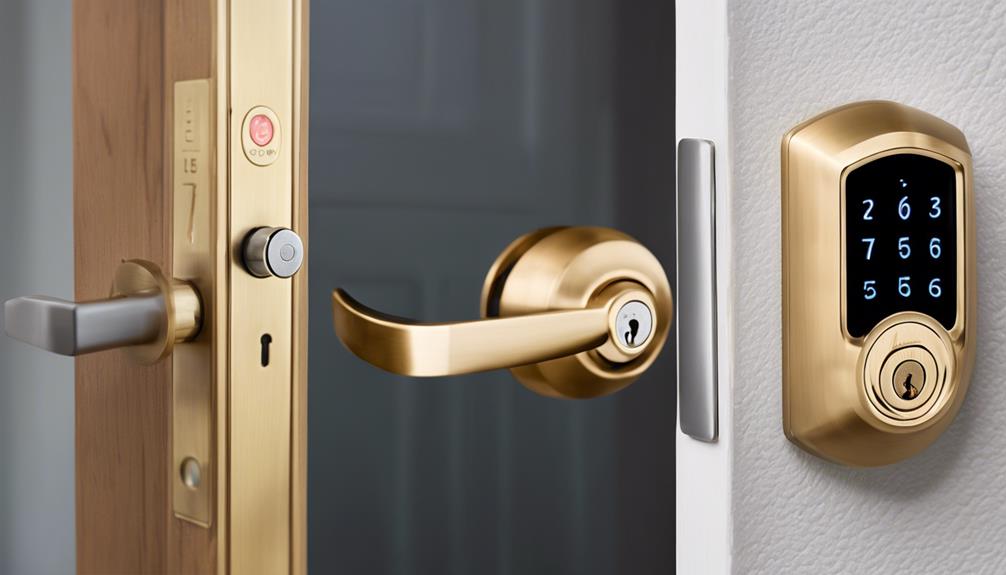
When assessing the cost and value of smart locks versus traditional locks, it is essential to take into account both initial expenses and long-term benefits. Smart locks generally require a higher initial investment due to their advanced technology, whereas traditional locks are more budget-friendly upfront. However, the enhanced convenience, remote access capabilities, and integration with smart home systems offered by smart locks may justify the additional cost for many homeowners.
Initial Costs of Traditional Locks
Evaluating the initial costs of traditional locks reveals them to be a cost-effective security option for homeowners. A thorough cost analysis shows that these locks typically require a lower upfront investment compared to their smart counterparts. Additionally, traditional locks offer a reliable long-term investment due to their simplicity and durability.
- Cost analysis: Traditional locks are generally less expensive initially, making them attractive for budget considerations.
- Maintenance expenses: While traditional locks may incur occasional costs for key replacements and repairs, these expenses are usually minimal.
- Long term investment: For homeowners prioritizing basic security without advanced features, traditional locks provide a sound financial comparison.
Initial Costs of Smart Locks
While traditional locks are favored for their lower upfront costs, smart locks represent a higher initial investment, typically ranging from $100 to $300, reflecting their advanced features and enhanced security benefits. A cost benefit analysis reveals that these additional expenses are justified by the security features, such as remote access and customizable access control. Smart locks also offer convenience options like keyless entry and integration with smart home systems, which are absent in traditional locks. In comparison with traditional locks, the higher initial cost of smart locks can be seen as a long term investment in improved security and ease of use. When evaluating initial costs, it is important to take into account the added value that smart locks bring.
Long-Term Value and Investment
When considering the long-term value, smart locks offer a compelling investment thanks to their advanced security features and capability to integrate with modern home automation systems. Smart locks often justify their higher initial cost through:
- Security benefits: Enhanced protection mechanisms and customizable access control.
- Technological advancements: Continuous updates and adaptability to new security trends.
- Home automation integration: Seamless integration with other smart devices for thorough home management.
In comparison, traditional locks, while initially cheaper, may incur higher maintenance and key replacement costs over time. Their long-term durability can also be a concern as they lack the technological advancements of smart locks. Ultimately, the cost comparison reveals that smart locks provide a future-proof investment with ongoing security enhancements and convenience.
Cost-Benefit Analysis
Smart locks, with their higher initial expenses, offer substantial long-term benefits that often outweigh the upfront costs. Conducting a value comparison reveals that smart locks provide significant advantages such as remote access, keyless entry, and integration with smart home systems. A detailed cost analysis shows that while traditional locks are initially cheaper, they may incur higher long-term costs for key replacements and maintenance. A benefits assessment indicates that smart locks enhance security and convenience, making them a wise investment evaluation. The expense breakdown further highlights the return on investment for smart locks through their advanced features and ease of use.
| Feature | Smart Locks | Traditional Locks |
|---|---|---|
| Initial Cost | Higher | Lower |
| Long-Term Costs | Lower | Higher |
| Added Value | High | Moderate |
Real-World Applications and Use Cases

Understanding the real-world applications and use cases of both smart locks and traditional locks is essential in determining their suitability across various settings. Smart locks are particularly advantageous in modern residential environments and commercial spaces that benefit from advanced security features and remote management. Conversely, traditional locks remain reliable and cost-effective for scenarios where simplicity and minimal technological dependence are preferred.
Best Scenarios for Using Traditional Locks
Opting for traditional locks is particularly advantageous for homeowners seeking a straightforward and reliable security solution devoid of advanced technological features. Traditional locks are highly suitable for various practical scenarios where simplicity and effectiveness are paramount.
- Outdoor security: Ideal for securing gates and sheds, traditional locks provide reliable protection without needing electricity.
- Historical buildings: Preserving the classic aesthetic of these structures, traditional locks blend seamlessly with their architectural style.
- Rental properties: Offering a cost-effective and easy-to-maintain solution, traditional locks are favored by landlords to guarantee hassle-free key management.
Additionally, traditional locks are perfect for storage units, providing consistent security without requiring remote access capabilities, making them a dependable choice for many applications.
Ideal Situations for Implementing Smart Locks
Implementing smart locks proves advantageous for homeowners seeking enhanced security and convenience through remote access control and real-time monitoring. Smart lock benefits include the ability to grant temporary codes to guests or service providers, ensuring secure yet flexible access. Individuals with busy lifestyles will appreciate the convenience of remote access, allowing them to open or close doors from anywhere. Home automation enthusiasts can seamlessly integrate smart locks with other smart home systems and voice assistants for streamlined control. Additionally, smart locks offer customization options, enabling users to tailor access methods and security settings to their preferences. These features collectively make smart locks an ideal choice for those prioritizing modern security solutions and stylish, functional designs.
Residential vs. Commercial Applications
Smart locks and traditional locks serve distinct roles in residential and commercial applications, each tailored to meet specific security needs and operational demands. In residential settings, smart locks offer keyless entry benefits and customizable access control, providing homeowners with enhanced convenience and security. Conversely, traditional locks remain popular for their simplicity and reliability.
In commercial environments, smart locks excel with advanced features such as centralized management solutions and time-sensitive access codes, important for businesses needing robust access control.
- Security comparisons: Smart locks offer remote monitoring, while traditional locks provide straightforward security.
- Access control: Smart locks allow for dynamic access management, unlike static key-based traditional locks.
- Environment considerations: Smart locks are ideal for dynamic commercial spaces; traditional locks fit static residential needs.
Case Studies and Testimonials
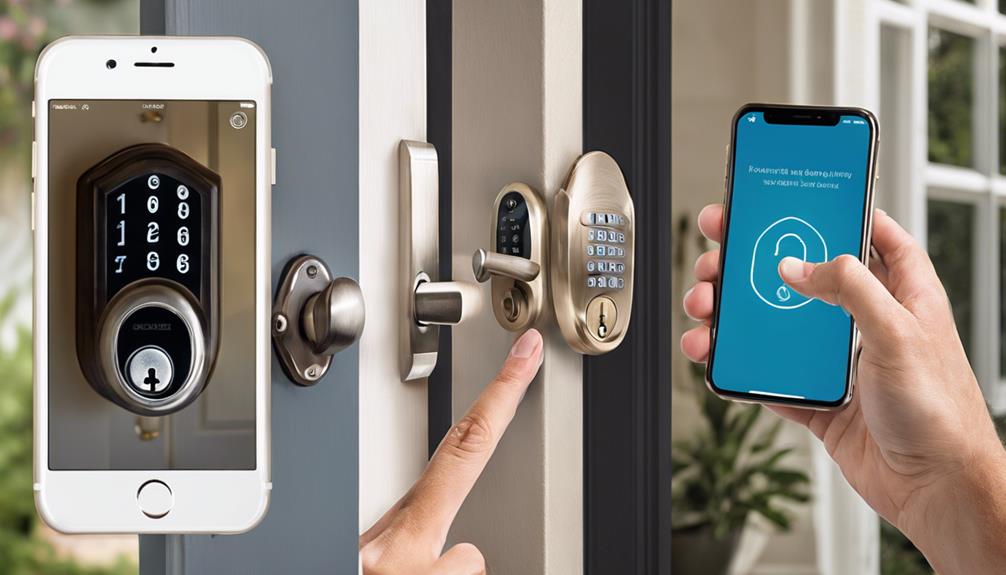
Examining real-life examples and customer testimonials provides valuable insights into the practical advantages and limitations of smart locks compared to traditional locks. Case studies reveal how smart locks have successfully enhanced home security and user convenience, while testimonials highlight the increased satisfaction and peace of mind reported by homeowners. Feedback from users underscores the preference for the advanced features and customization options that smart locks offer over conventional locking mechanisms.
Real-Life Examples of Traditional Lock Usage
Traditional locks have consistently demonstrated their effectiveness and reliability in real-life scenarios, as evidenced by numerous case studies and testimonials. These traditional mechanisms offer distinct security benefits and provide peace of mind for homeowners. For instance, a case study highlighted how a traditional lock thwarted a break-in attempt, showcasing its practical applications in home protection. Additionally, testimonials emphasize the long-term reliability of traditional deadbolts, with some securing properties for decades without fail. Real-life examples further illustrate how traditional locks offer peace of mind during extended vacations, ensuring homes remain protected.
- Traditional lock prevents a break-in attempt
- Testimonial on the longevity and durability of traditional deadbolts
- Homeowners’ peace of mind during extended absences
These examples underscore the enduring value of traditional locks in home security.
Success Stories with Smart Locks
While traditional locks have proven their worth in numerous real-life scenarios, many homeowners are now turning to smart locks for enhanced security and convenience. One homeowner shared how a smart lock prevented a break-in by sending real-time alerts through remote monitoring. A rental property owner highlighted the benefit of efficient access management, remotely controlling guest stays without physical keys. Another user praised the seamless integration of smart locks with existing smart home devices, boosting overall security. A family expressed gratitude for the peace of mind provided by being able to monitor and control their front door from anywhere. Additionally, a business owner found that smart locks improved employee access management, granting temporary codes and monitoring entry logs effectively.
Customer Feedback and Satisfaction
User testimonials and case studies underscore the heightened satisfaction and enhanced security that smart locks provide over traditional locking mechanisms. Customers frequently highlight the following benefits:
- Ease of access: The convenience of keyless entry and remote control resonates with busy homeowners.
- Peace of mind: Advanced security features and real-time monitoring capabilities offer reassurance.
- Customization options: Tailoring access permissions to fit various user preferences enhances the user experience.
Feedback from users indicates a clear preference for smart locks due to their advanced security features and ease of use. Testimonials often emphasize the significant peace of mind achieved through remote access and monitoring. Additionally, smart locks’ customization options cater to diverse needs, making them a preferred choice for modern home security solutions.
Conclusion and Recommendations
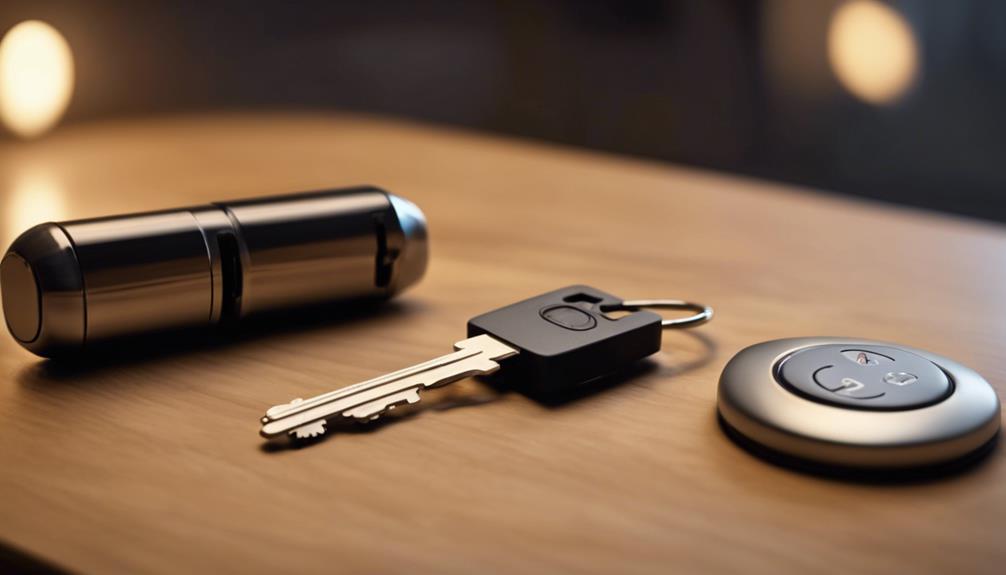
To sum up, both smart locks and traditional locks offer distinct advantages and considerations, making the choice dependent on individual needs and preferences. Factors such as ease of use, security features, and installation processes should be carefully evaluated. For those seeking modern convenience and advanced security, smart locks are recommended, while traditional locks remain a reliable option for those prioritizing simplicity and proven effectiveness.
Summary of Key Points
Smart locks and traditional locks each offer distinct advantages and drawbacks, making the choice between them dependent on individual needs and priorities.
- Security comparison: Smart locks provide advanced security features and remote access, while traditional locks are known for their reliability and simplicity.
- Convenience features: Smart locks offer keyless entry and integration with smart home systems, enhancing convenience, whereas traditional locks rely on physical keys.
- Cost analysis: Smart locks often have higher upfront costs and potential additional expenses for installation, whereas traditional locks are generally more affordable.
Real-life examples illustrate that busy homeowners might prefer the flexibility and customization of smart locks, while others may prioritize the straightforward, dependable nature of traditional locks. Ultimately, the decision hinges on balancing security, convenience, and cost.
Factors to Consider When Choosing Between Smart Locks and Traditional Locks
When deciding between smart locks and traditional locks, it is important to consider the specific security and convenience requirements of your household. Take into account your security priorities, as smart locks offer advanced features like remote access, but may also have potential vulnerabilities. Evaluate technology compatibility with existing smart home devices to guarantee seamless integration. Maintenance requirements should be evaluated, noting that smart locks may need more frequent updates and battery changes compared to traditional locks. Cost implications are another factor, with smart locks typically being more expensive upfront. Finally, the installation process varies, with smart locks often requiring professional installation, while traditional locks can usually be installed by homeowners themselves. Seek professional advice to make an informed decision.
Recommendations Based on Different Needs and Preferences
Choosing the right type of lock depends on individual needs and preferences, with smart locks offering advanced technological features and traditional locks providing straightforward, reliable security. For those with specific security preferences, hybrid solutions that combine smart and traditional locks can offer a balanced approach. Lifestyle choices also play a significant role; tech enthusiasts and busy homeowners may favor smart locks for their customizable access and remote monitoring capabilities. Conversely, those who value simplicity and classic security measures might lean towards traditional locks.
- Smart locks: Ideal for those seeking modern convenience, remote access, and integration with smart home systems.
- Traditional locks: Best for individuals preferring minimalistic living and straightforward security.
- Hybrid solutions: Combine the best of both worlds, catering to varied security needs and home aesthetics.
Additional Resources and Links
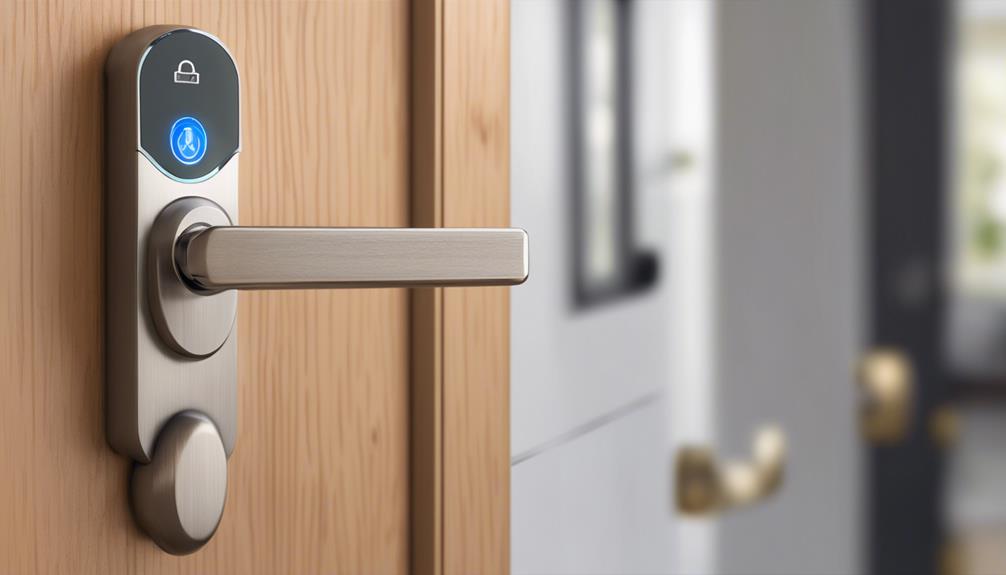
For those seeking more thorough information, several resources are available to guide your decision-making. You can explore detailed articles on various types of traditional locks such as deadbolt and cylinder locks, as well as informative pieces on smart lock technologies. Additionally, consider consulting residential locksmith services like Low Rate Locksmith and accessing further reading materials and guides for expert advice and practical tips.
Link to Detailed Articles on Types of Traditional Locks (e.g., Deadbolt Locks, Cylinder Locks)
In-depth information on various types of traditional locks, including deadbolt locks, cylinder locks, and mortise locks, can be found in the following detailed articles, offering valuable insights into their mechanisms and security features. These resources also cover important aspects like lock maintenance, key duplication, lock picking, and security vulnerabilities, ensuring thorough knowledge for enhancing home safety.
- Deadbolt Locks: Explore the robust construction and resistance to forced entry.
- Cylinder Locks: Understand the ease of key insertion and the mechanics behind their popularity.
- Mortise Locks: Investigate the intricate design and multiple locking points that offer high security.
These articles provide essential information for anyone looking to secure their home effectively with traditional locking mechanisms.
Link to Detailed Articles on Types of Smart Locks
To explore the various types of smart locks and their innovative features, the following in-depth articles provide thorough insights and valuable resources. These articles highlight the smart lock benefits such as keyless entry, remote access, and advanced security features like activity monitoring and tamper alerts. They also investigate traditional lock drawbacks, particularly their reliance on physical keys and manual operation. Through a detailed security comparison, you will gain a thorough understanding of how smart locks enhance home safety. Additionally, insights into the installation process and user experience with various smart lock models offer practical guidance for homeowners. For those seeking modern security solutions, these resources are indispensable.
Link to Residential Locksmith Services Offered by Low Rate Locksmith
Low Rate Locksmith offers a wide range of residential locksmith services designed to enhance home security with both traditional and smart lock solutions. Their all-encompassing offerings guarantee that homeowners have access to expert assistance for all their lock-related needs.
- Lock installation: Professional setup for both traditional and smart locks.
- Lock repair: Efficient solutions to fix any lock issues promptly.
- Rekeying services: Alter existing locks to work with new keys for enhanced security.
In addition to these, Low Rate Locksmith also provides key duplication services, ensuring you always have spare keys when needed. Whether you are looking to upgrade to a smart lock system or maintain your traditional locks, Low Rate Locksmith has you covered with reliable and professional residential locksmith services.
Further Reading and Helpful Guides
For those interested in further exploring the distinctions between smart locks and traditional locks, a variety of thorough guides and resources are available to help you make an informed decision. Numerous online articles and expert reviews provide detailed security comparisons, highlighting the strengths and vulnerabilities of each lock type. Additionally, step-by-step installation tips guarantee proper setup, while maintenance guidelines detail how to keep both smart and traditional locks in prime condition. User experience insights offer real-world perspectives on ease of use and reliability, helping potential buyers understand practical implications. Finally, detailed cost considerations break down the financial aspects, from initial purchase to long-term expenses, aiding in a well-rounded evaluation of your home security options.
Conclusion
In evaluating smart locks and traditional locks, it becomes evident that each serves distinct security needs and preferences. While some may argue that smart locks’ reliance on technology poses risks, advancements in cybersecurity mitigate these concerns, ensuring robust protection. Smart locks offer unparalleled convenience and flexibility, whereas traditional locks provide reliable, time-tested security. Ultimately, the choice hinges on individual priorities, with smart locks emerging as a forward-thinking solution for modern home security.









Leave A Comment